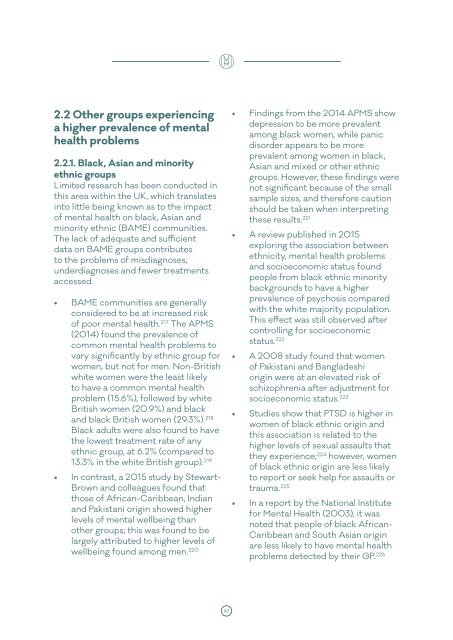FUNDAMENTAL FACTS ABOUT MENTAL HEALTH 2016
fundamental-facts-about-mental-health-2016
fundamental-facts-about-mental-health-2016
Create successful ePaper yourself
Turn your PDF publications into a flip-book with our unique Google optimized e-Paper software.
2.2 Other groups experiencing<br />
a higher prevalence of mental<br />
health problems<br />
• Findings from the 2014 APMS show<br />
depression to be more prevalent<br />
among black women, while panic<br />
disorder appears to be more<br />
prevalent among women in black,<br />
2.2.1. Black, Asian and minority<br />
Asian and mixed or other ethnic<br />
ethnic groups<br />
groups. However, these findings were<br />
Limited research has been conducted in not significant because of the small<br />
this area within the UK, which translates sample sizes, and therefore caution<br />
into little being known as to the impact should be taken when interpreting<br />
of mental health on black, Asian and<br />
these results. 221<br />
minority ethnic (BAME) communities.<br />
The lack of adequate and sufficient<br />
• A review published in 2015<br />
data on BAME groups contributes<br />
exploring the association between<br />
to the problems of misdiagnoses,<br />
ethnicity, mental health problems<br />
underdiagnoses and fewer treatments<br />
and socioeconomic status found<br />
accessed.<br />
people from black ethnic minority<br />
backgrounds to have a higher<br />
• BAME communities are generally<br />
prevalence of psychosis compared<br />
considered to be at increased risk<br />
with the white majority population.<br />
of poor mental health. 217 The APMS<br />
This effect was still observed after<br />
(2014) found the prevalence of<br />
controlling for socioeconomic<br />
common mental health problems to<br />
status. 222<br />
vary significantly by ethnic group for<br />
women, but not for men. Non-British<br />
white women were the least likely<br />
to have a common mental health<br />
problem (15.6%), followed by white<br />
• A 2008 study found that women<br />
of Pakistani and Bangladeshi<br />
origin were at an elevated risk of<br />
schizophrenia after adjustment for<br />
socioeconomic status. 223<br />
British women (20.9%) and black<br />
• Studies show that PTSD is higher in<br />
and black British women (29.3%). 218<br />
women of black ethnic origin and<br />
Black adults were also found to have<br />
this association is related to the<br />
the lowest treatment rate of any<br />
higher levels of sexual assaults that<br />
ethnic group, at 6.2% (compared to<br />
they experience; 224 however, women<br />
13.3% in the white British group). 219<br />
of black ethnic origin are less likely<br />
• In contrast, a 2015 study by Stewart-<br />
Brown and colleagues found that<br />
to report or seek help for assaults or<br />
trauma. 225<br />
those of African-Caribbean, Indian<br />
• In a report by the National Institute<br />
and Pakistani origin showed higher<br />
for Mental Health (2003), it was<br />
levels of mental wellbeing than<br />
noted that people of black Africanother<br />
groups; this was found to be<br />
Caribbean and South Asian origin<br />
largely attributed to higher levels of<br />
are less likely to have mental health<br />
problems detected by their GP. 226<br />
42


